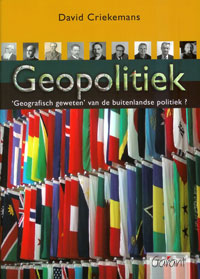Introducing David Criekemans
 David Criekemans is Associate Professor in ‘Belgian and Comparative Foreign Policy’ at the University of Antwerp (Belgium) and in ‘Geopolitics’ at both the Royal Military Academy in Brussels (Belgium) and the International Centre for Geopolitical Studies (ICGS) in Geneva (Switzerland). He also works at the Flemish Centre for International Policy (FCIP) in Antwerp (Belgium).
David Criekemans is Associate Professor in ‘Belgian and Comparative Foreign Policy’ at the University of Antwerp (Belgium) and in ‘Geopolitics’ at both the Royal Military Academy in Brussels (Belgium) and the International Centre for Geopolitical Studies (ICGS) in Geneva (Switzerland). He also works at the Flemish Centre for International Policy (FCIP) in Antwerp (Belgium).
Louis-Alfons Nobels is graduate of the Catholic University of Leuven Law faculty and currently studying International Relations and Diplomacy. He works at the United Nations Association Flanders Belgium. Karen Van Laethem is Researcher for the Fund for Scientific Research, Flanders, at the Faculty of Law of the Free University of Brussels.
You can download the pdf-file of Simulation Exercise (903 kB)
Article
Between August 7th and August 12th 2008, hostilities broke out between the Republic of Georgia and the Russian Federation. On August 26th, Russia officially recognised the secessionist territories Abkhazia and South Ossetia as independent states. This recognition was severely condemned by Georgia, NATO, UN Secretary-General Ban Ki-moon, the OSCE, the United States (U.S.) and the European Union (EU).
Georgian-Russian relations have been seriously worsening since 2004, when Georgian President Saakashvili adopted a liberal reformist course, a Euro-Atlantic foreign policy orientation and an assertive approach to the protracted Abkhaz and South Ossetian conflicts. Viewing Georgia’s deepening ties with NATO, the EU and the U.S. as a threat to its security, Russia has employed a range of political and economic levers against Georgia, including economic sanctions, visa restrictions and closure of transport links. Georgia argues that Russia directly intervenes in its internal affairs by nurturing trouble with Abkhazia and South Ossetia. It has criticised Moscow’s economic, budgetary and military support to the breakaway regions and has convinced many in the U.S. and the EU that neither Russia’s mediation efforts in the conflicts nor its peacekeeping troops are neutral. Moscow’s heavyhanded policies have in turn reinforced Georgia’s desire to join NATO (International Crisis Group, 2008).
Russian and Georgian relations go far beyond the bilateral problems between two countries. The two countries have competing political projects and geopolitical visions of the Southern Caucasus. The Southern Caucasus with its post-Soviet legacies of authoritarian rule, endemic corruption, military stockpiles, overlapping ethnic and religious fault lines, economic growth inequities, mineral wealth, and geo-strategic positioning, stand at a tipping point in their history. Without proper monitoring and support, they could become epicentres of international instability (Tim Radjy, 2006).
The Georgian-Russian conflict is divided over a number of issues including trade, espionage and energy (Ivars Indans, 2007). Most dangerously of all is the conflict on the status of the two pro-Russian breakaway regions, Abkhazia and South Ossetia: although so often described as frozen conflicts, the situation in both regions, which seek independence from Georgia, has deteriorated quickly. The precedent of Kosovo heartened the leaders of the breakaway regions and spurred Georgia to take action to reintegrate its lands. In reaction to the West’s recognition of Kosovo’s independence, Russia began to institutionalize its support for South Ossetia and Abkhazia and formally lifted trade sanctions against them (Sergei Markedonov, 2008). Since the early years of independence, Georgia has been negotiating terms of political status with these breakaway regions, although the process has often reached a deadlock. The existing formats of political negotiation and peacekeeping have proved ineffective and the Georgian side has requested a comprehensive review of the entire peace process. Many factors hinder the process of conflict settlement. Topping the list are images of the other as the ‘enemy’ and a deep mistrust among the sides. A comprehensive strategy to break the deadlock needs to be devised (Archil Gegeshidze, 2008).
As conflict resolution has proven impracticable, it is now time to consider altering existing arrangements in order to prevent a further escalation of violence (Stacy Closson, 2008). This setting forms the core of the negotiation exercise which you are about to embark upon.
Related webpages and book
 Onderzoeksgroep Diplomatie en Geopolitiek
Onderzoeksgroep Diplomatie en Geopolitiek- Vlaams Steunpunt Buitenlands Beleid
- Personal page of David Criekemans
“Geopolitiek, ‘geografisch geweten’ van de buitenlandse politiek?”, Garant / Maklu (Antwerpen / Apeldoorn), 2007
